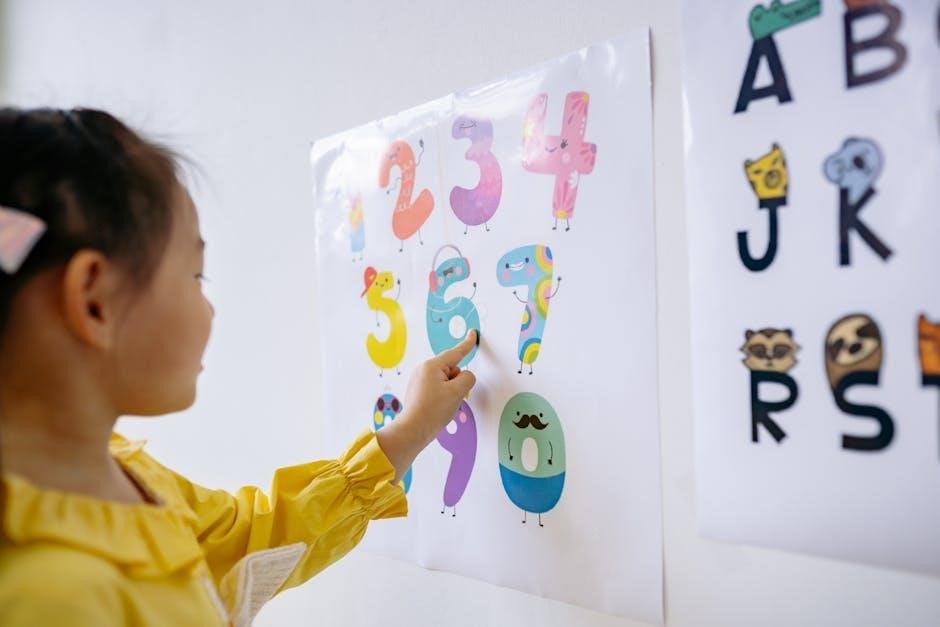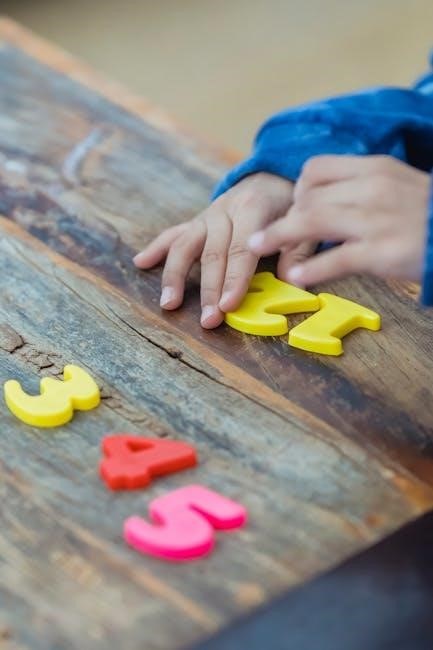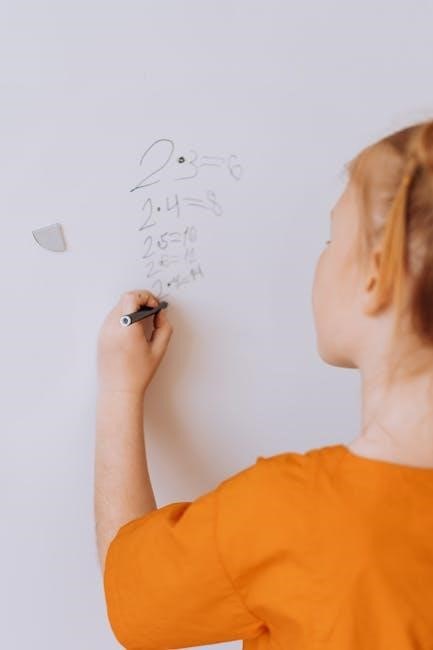math olympiad elementary pdf
Welcome to the world of Elementary Math Olympiad‚ a rewarding platform for students in grades 3-5 to explore mathematical problem-solving and critical thinking. This engaging competition fosters a deep understanding of math concepts while nurturing creativity and confidence. Designed for young learners‚ it offers challenging yet fun problems that inspire a love for mathematics and prepare students for future academic success.
Overview of Math Olympiad Competitions
Elementary Math Olympiad competitions are engaging annual events designed for students in grades 3-5‚ fostering problem-solving skills and mathematical thinking. These contests typically consist of multiple rounds‚ testing logic‚ arithmetic‚ and creative problem-solving abilities. Participants are challenged with unique questions that go beyond standard curriculum‚ encouraging critical thinking and teamwork. Many schools and organizations worldwide host such events‚ providing a platform for young learners to showcase their math talents and build confidence. The competitions are structured to be both educational and fun‚ promoting a lifelong love for mathematics.

Structure of Elementary Math Olympiad Competitions

Elementary Math Olympiad competitions typically feature multiple rounds‚ including individual and team events‚ designed for students in grades 3-5. The format tests problem-solving‚ logic‚ and math skills.
Format and Rounds
Elementary Math Olympiad competitions are divided into rounds that test various skills. The sprint round focuses on quick‚ accurate problem-solving‚ while the target round involves more complex‚ multi-step questions. Students typically participate in individual and team events‚ fostering collaboration and healthy competition. The format includes age-specific divisions‚ ensuring problems are tailored to grade levels. Each round is designed to evaluate logical reasoning‚ mathematical fluency‚ and creative thinking‚ preparing students for advanced challenges in mathematics and beyond.

Recommended Resources for Preparation
Popular PDF guides include “Maths Olympiad: Unleash The Maths Olympian In You!” for ages 9-12‚ offering exercises and logic tasks. Workbooks like “Math Olympiad Contest Problems” provide practice questions for elementary students‚ while official Mathematical Olympiad resources offer detailed solutions and past papers for comprehensive preparation.
Popular PDF Guides and Workbooks
Discover essential PDF guides like “Maths Olympiad: Unleash The Maths Olympian In You!” tailored for ages 9-12‚ offering engaging exercises and logic tasks. “Math Olympiad Contest Problems for Elementary and Middle Schools Vol 1” provides a comprehensive collection of practice questions. These resources‚ available as free PDF downloads‚ cater to various skill levels‚ ensuring young learners can build confidence and mastery in mathematical problem-solving. They are ideal for both classroom use and independent study‚ making them a valuable tool for elementary math Olympiad preparation.
Useful Worksheets for Practice
Enhance your preparation with useful worksheets designed for elementary math Olympiad practice. Resources like “Math Olympiad Contest Problems for Elementary and Middle Schools Vol 1” and “100 Great Problems of Elementary Mathematics” offer a wide range of exercises. These worksheets cover arithmetic‚ logic‚ and problem-solving‚ catering to different skill levels. Ideal for grades 3-5‚ they provide a structured way to improve math fluency and critical thinking. Download these free PDF worksheets to engage in regular practice and build confidence for competitions.

Sample Problems from Past Competitions
Explore authentic sample problems from past elementary math Olympiads‚ covering arithmetic‚ logic‚ and reasoning. These exercises‚ sourced from PDF guides like “Math Olympiad Contest Problems Vol 1‚” provide a glimpse into competition formats and challenge levels‚ helping students prepare effectively for future events.
Examples for Grade 3 Students
Grade 3 students engage with problems like calculating the sum of odd numbers or identifying shapes in a figure. For instance‚ one problem asks to find the total number of rectangles in a grid. Another example involves determining the combined age of siblings. These questions‚ found in resources like Math Olympiad Contest Problems Vol 1‚ focus on arithmetic‚ logic‚ and counting skills. They are designed to be challenging yet accessible‚ encouraging young learners to think creatively and build problem-solving confidence. These examples are perfect for early math exploration and skill development.
Challenging Questions for Grade 5
Grade 5 students face more complex problems‚ such as calculating the sum of consecutive numbers or determining the number of rectangles in a detailed grid. For example‚ one question asks to find the total number of small squares in a larger figure divided into identical sections. Another problem involves solving for an unknown variable in a multi-step equation. These challenges‚ found in resources like Math Olympiad Contest Problems for Elementary and Middle Schools Vol 1‚ require advanced logical reasoning and problem-solving skills‚ preparing students for higher-level math competitions.

Benefits of Participating in Math Olympiads
Participating in Math Olympiads enhances problem-solving skills‚ fosters creativity‚ and builds confidence. It also provides early exposure to advanced math concepts and logical reasoning‚ enriching overall academic growth.
Skills Developed and Confidence Building
Participating in Math Olympiads helps students develop critical thinking‚ problem-solving‚ and analytical skills. It enhances their ability to approach complex problems creatively and systematically. Through consistent practice and exposure to challenging questions‚ students build resilience and perseverance. The competitive environment fosters confidence as they learn to present solutions clearly and defend their reasoning. These experiences not only strengthen mathematical abilities but also prepare students for future academic and real-world challenges‚ nurturing a growth mindset and a lifelong love for learning.

Preparation Strategies
Effective preparation involves using workbooks‚ solving past problems‚ and practicing regularly. Utilize PDF guides for structured learning and seek teacher guidance for focused improvement.
Effective Study Tips and Teacher Involvement
Effective preparation for math olympiads involves creating a structured study schedule and practicing regularly with workbooks and past papers. Utilize PDF guides for targeted learning‚ focusing on problem-solving techniques and logical reasoning. Teachers play a crucial role by providing personalized feedback‚ guiding students through challenging problems‚ and encouraging consistent practice. They can also organize group sessions to foster collaboration and healthy competition among participants‚ ensuring students are well-prepared for the contest environment.
Regular reviews of mistakes and progress tracking are essential for improvement.

Past Competitions and Notable Events
Humble ISD recently hosted their fourth annual elementary Math Olympiad Tournament‚ showcasing students’ problem-solving skills after months of preparation‚ inspiring confidence and a love for mathematics.
Humble ISD Tournament Example
The Humble ISD Tournament exemplifies the spirit of elementary math competitions. Held annually‚ it brings together students from various schools for a day of problem-solving and math challenges. The event concludes months of preparation‚ showcasing students’ skills in arithmetic‚ logic‚ and creative thinking. Participants demonstrate teamwork and individual brilliance‚ making it a memorable experience. This tournament highlights the growing popularity of math olympiads and their role in nurturing young mathematicians’ confidence and problem-solving abilities.

Divisions and Age Groups
Elementary Math Olympiad is divided into age-based categories‚ ensuring fair competition. Students in grades 3-5 participate in the elementary division‚ while older students compete in middle school divisions.
Elementary vs. Middle School Divisions
The Elementary Math Olympiad is tailored for students in grades 3-5‚ focusing on foundational math skills and problem-solving. Middle school divisions cater to older students‚ introducing more advanced concepts and complex challenges. Both levels aim to foster mathematical thinking and creativity but are structured to suit the academic readiness of participants. The elementary division emphasizes basic arithmetic‚ geometry‚ and logic‚ while middle school divisions incorporate algebra and higher-level reasoning. This tiered approach ensures age-appropriate competition and skill development.

Accessing Solutions and Additional Resources
Elementary Math Olympiad solutions and resources are widely available online. Official websites and PDF guides offer detailed answers‚ practice problems‚ and study materials to support student preparation.
Where to Find Answers and Further Materials
Solutions and additional materials for elementary math olympiad problems are readily available online. Official websites‚ educational platforms‚ and PDF guides provide detailed answers and practice resources. Popular publications like Math Olympiad Contest Problems for Elementary and Middle Schools Vol 1 and 100 Great Problems of Elementary Mathematics offer comprehensive solutions. Many resources are free to download‚ ensuring accessibility for students and educators. These materials are invaluable for understanding problem-solving strategies and preparing for competitions effectively.
Participating in elementary math olympiads fosters problem-solving skills‚ creativity‚ and confidence. With accessible resources like PDF guides and practice materials‚ students can embrace math with enthusiasm and excel.
Encouragement and Final Thoughts
Embrace the Elementary Math Olympiad as a journey to discover your mathematical potential. With dedication and practice‚ you can unlock new skills and confidence. Utilize the wealth of resources like PDF guides and past papers to strengthen your problem-solving abilities. Remember‚ every challenge is an opportunity to grow and excel. Encourage your peers‚ learn from each attempt‚ and most importantly‚ enjoy the process of learning. The world of math is vast and rewarding—dive in with enthusiasm and make it your own!
